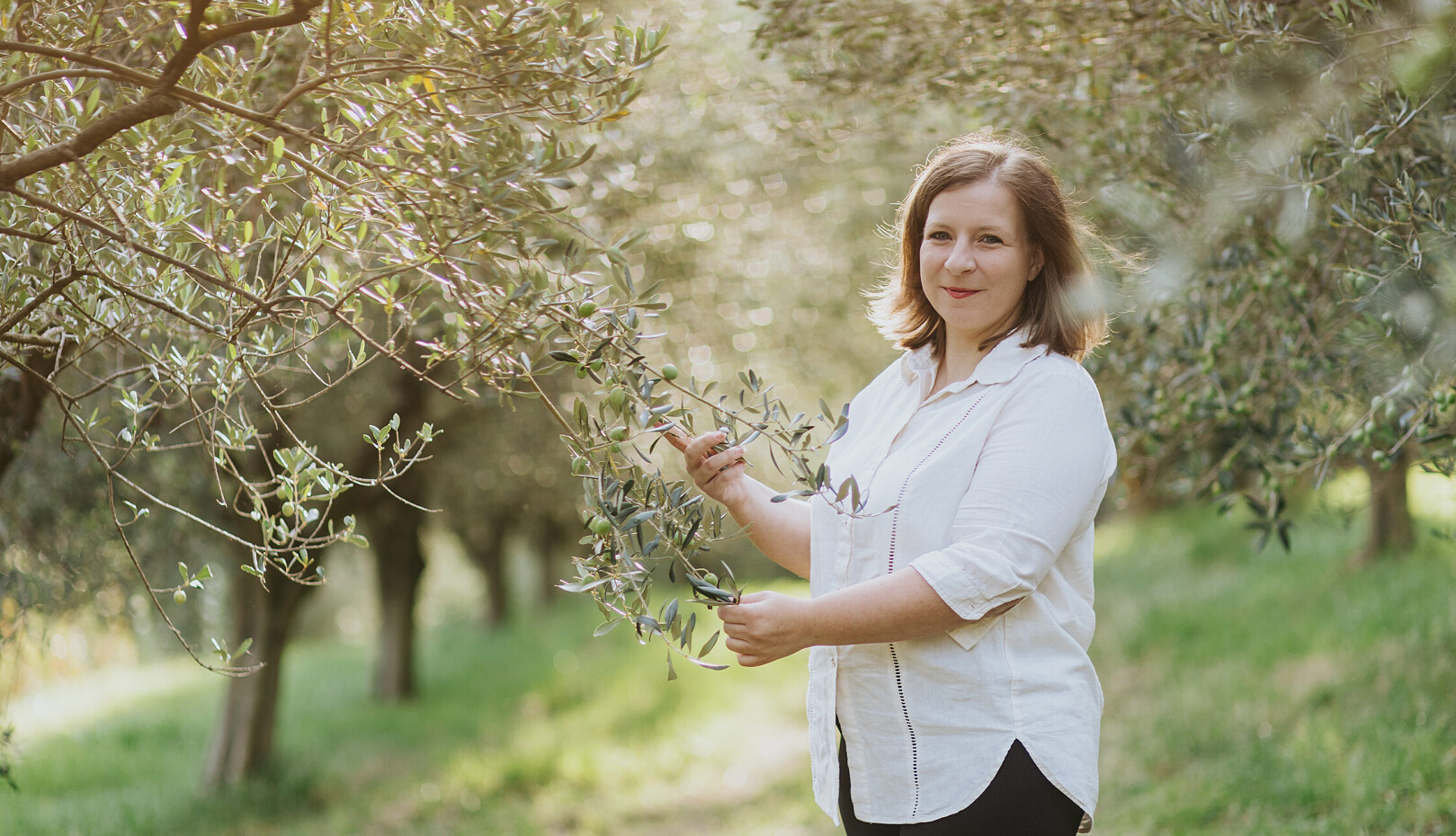
“An olive tree must breathe in its own rhythm”
On the slopes of the Istrian hills above Izola, where the sea meets the land and the wind smells of rosemary, there is a farm without a roof, but with the sky above it. Here, among the olive trees that have been nurtured for decades, Martina Veršnik, together with her parents, grandparents and children, runs the organic farm Olea d’Istria, where life is not measured in hectares, but in the patience demanded by nature.
Roots that remain in the soil
“My grandpa could not live without the land. He came from a large farm and, although the spirit of the time leaned towards industry, he was much more interested in working the land – vines, fruit trees, olives. And we helped him with it. I was about as old then as my older daughter is now,” Martina Veršnik tells us about the beginnings of the family farm. Her parents continued and expanded her grandfather’s work. Each generation added something of its own, and each contributed their specific knowledge.
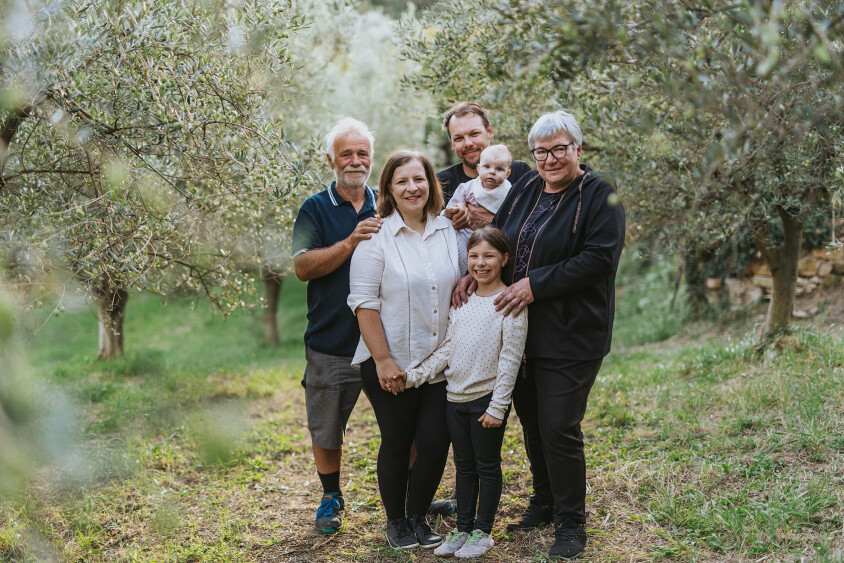
Today, the young mother of two runs the organic farm Olea d’Istria. But she is not alone: all four generations work on the farm, united by their respect for the land and by the fact that they always help each other. “My father is a mechanic, my mother an economist and lawyer, and I am an andragogist and agronomist. We all work and contribute in our own way, but always together. Even now that I run the farm, nothing has changed. We agree on everything. A farm is not just one person – it is an entire family,” she adds.
“Farming is an activity without a roof. We depend on the soil, the weather, and on people who understand what effort for quality truly means.”
17 varieties and a great deal of patience
On a bit more than six hectares, they cultivate fruit trees, herbs, and 17 olive varieties, including all 6 native ones. This was their choice when they decided to expand the farm. “It was a bit bold, because native varieties are not the most productive. You get half as much oil from them as from modern varieties. But our goal was not quick profit. We wanted to preserve what is native, authentic, Istrian – these old, rare varieties. We collected grafts throughout Istria, sometimes from old olive groves that had already been overtaken by forest. It paid off, because now we have a truly beautiful collection of olive trees,” says Martina, who grew up among these trees and now watches her daughters grow up beside them.
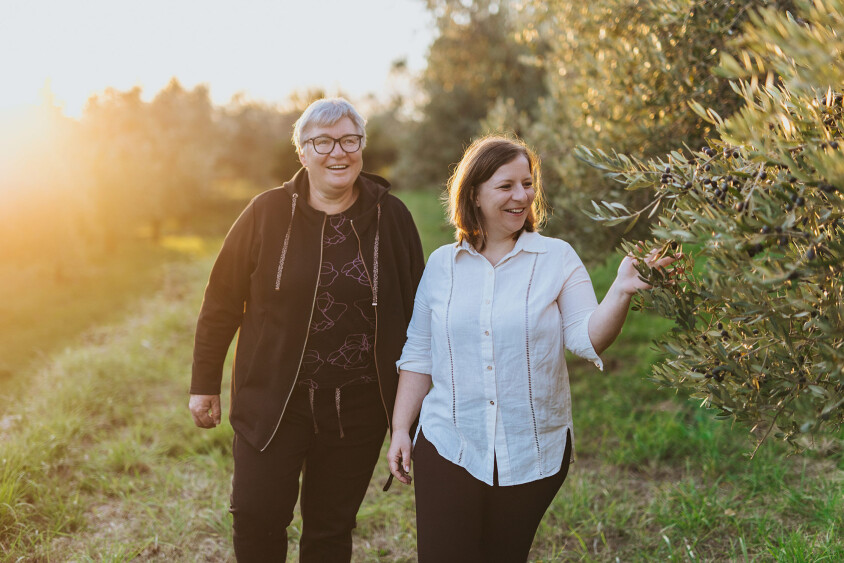
With the different varieties they create various products: single-variety oils, blends, and also herb- and citrus-infused oils. “We also make some special things, like figs in olive oil, olive salt… But always exclusively from what grows here,” she explains. Besides olives, they also grow cherries, figs, jujubes, mandarins, lemons and herbs, all of which they include in their products. They are known for their citrus- and herb-infused olive oils and for their table olives in five versions.
This year, they were delighted to receive a gold award for their table olives at the Festival of Table Olives (2025). “These are the moments when you know you did something right. But awards aren’t everything. The most beautiful thing is when satisfied customers come back. When they say: your oil tastes like Izola,” Martina smiles.
Organic – from day one
At Olea d’Istria they have been organic from the very beginning. “At the time, people thought we were strange. Everyone said: why complicate when you can spray and have peace. But we were not looking for peace or shortcuts… We wanted the soil to remain alive and keep its breath. Today I see it was worth it. The food is less polluted, the oil healthier, and people feel that,” she says proudly.
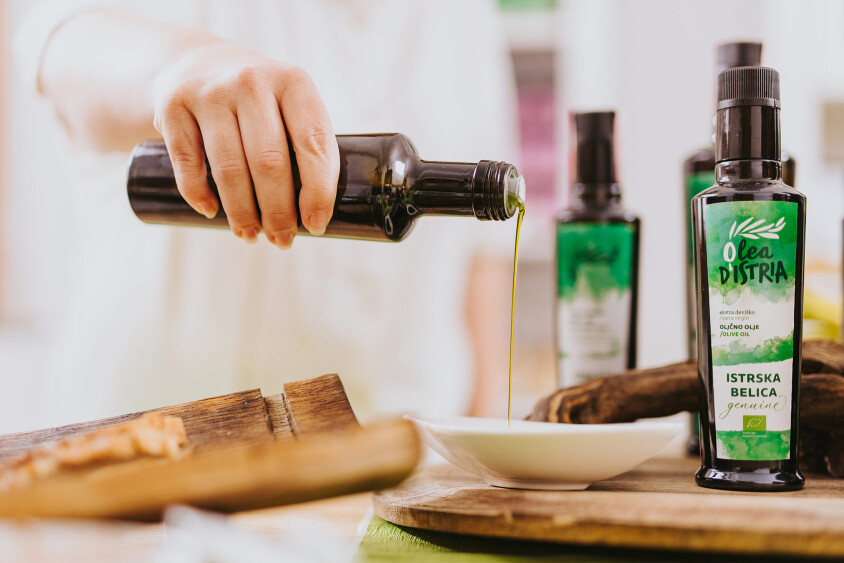
Their oil also carries the protected designation of origin – Extra Virgin Olive Oil of Slovenian Istria – which means it meets stricter traceability and quality criteria than standard extra virgin oil. Samples are regularly sent for chemical and sensory analysis. “Every year we submit samples and so far we have never had any issues with proving quality. But everything starts in the grove. If the fruit is good, the processing careful, and the person honest in their work, then the final product will also be good,” she believes.
They produce just over 2,000 litres of olive oil a year, depending on the harvest. “An olive tree breathes in its own rhythm: some years it inhales, some years it exhales. If you want quality, you must follow its rhythm, not your own,” Martina says.
“Organic farming requires more work, but it is more respectful – toward the land and toward people.”
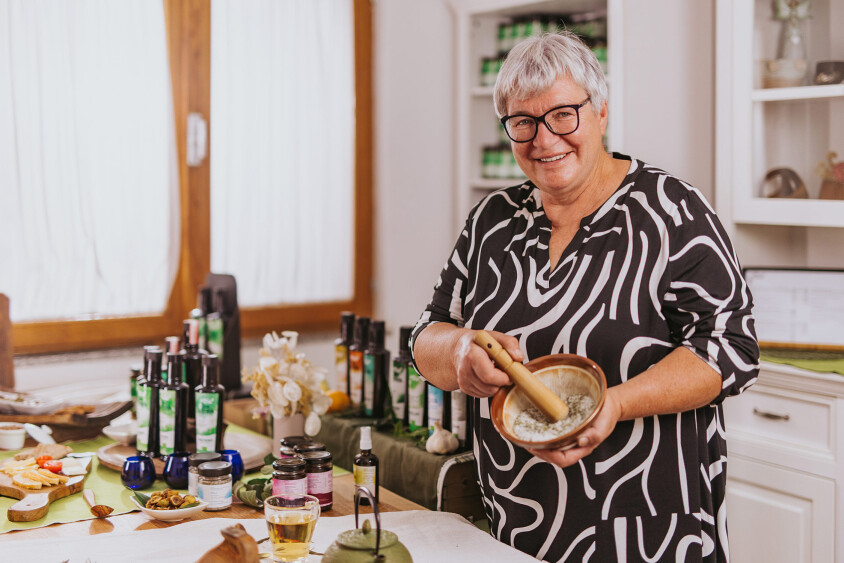
At home, among people and olives
Most of their sales happen locally, some at fairs and in boutique shops. They also organise tastings and tours of the olive groves, visited by locals, groups and tourists. “People like to see how and what we do. They like to feel that it’s real. We sit down with them, taste the oil, talk a little. It means a lot to them – that you take the time,” she explains.
They have also set up a small sales corner at Belvedere, where they offer more than 25 products: single-variety and infused oils, table olives, herb salt and various fruit preserves.
“We don’t have a website because people find us anyway. When they taste our products, they often recommend them to others. That’s the best advertisement,” Martina believes.
Looking ahead
Although space limits their future development, they are not short of ideas. “Our production area is small, we have no indoor space for machinery, everything is outdoors, but we want to create products with higher added value. We have the knowledge, the will and perseverance,” she says.
She is currently focused on motherhood, as she became a mother for the second time six months ago. But she still finds moments of peace among the olive trees: “Under a tree your thoughts clear. You connect with the soil, the air, the sun. That’s when you get the information you need.”
At the Olea d’Istria farm nothing happens by force. Nature sets the rhythm, and they follow it – slowly, patiently and with love that can be tasted in every drop of oil.





